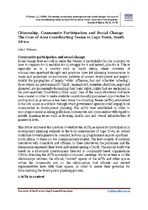Citizenship, community participation and social change: The case of area coordinating teams in Cape Town, South Africa
Abstract
Social change does not roll in under the wheels of inevitability On the contrary; we have to organize for it, mobilize for it, struggle for it and indeed, plan for it. This is especially so in a country such as South Africa, where centuries of colonial-cum-apartheid thought and practices have led planning bureaucracies to create and perpetuate socioeconomic patterns of uneven development and neglect. Amidst the geographies of largely "white" affluence, fear and collective "othering", those others, i.e. predominantly "black", unemployed, homeless, destitute, angry and alienated, are increasingly demanding their basic rights, rights that are enshrined in the post-apartheid Constitution (RSA 1995). One of the many structures that have been created in order to make available constitutionally guaranteed opportunities for participation in governance has been Areas Coordinating Teams (ACTs), established in the late 1990s as a vehicle through which government agencies could engage local communities in development planning. The ACTs were established in order to encourage consensus among politicians, bureaucrats and communities with regard to specific planning issues such as housing, health care and overall infrastructure at grassroots level.
This article addresses the question of whether the ACTs, as spaces for participation in development planning available to the local communities of Cape Town, do indeed contribute towards grassroots- oriented, bottom-up programmers in post-apartheid
South Africa. It draws on two complementary studies. The first consists of informal interviews with councilors and officials. In these interviews, the politicians and the bureaucrats expressed their views and understanding of ACTs. The second study was based on a structured questionnaire directed at community-based organizations (CBOs) attending the ACTs initiated/coordinated meetings. My focus here is on the relationships between the official, "invited" spaces of the ACTs and other spaces within the community and on the relationships that officials and elected representatives have with these spaces, in order to assess their potential for democratizing the development planning process.

